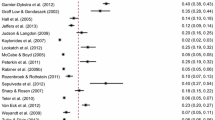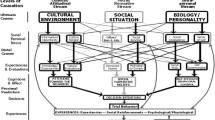Abstract
The misuse of prescription stimulant medications (MPS) and academic dishonesty (AD) are both problematic behaviors among college students. Although both behaviors are linked to a student’s desire to succeed academically, little research has been conducted to examine the relationship between these behaviors. The purpose of this study was to determine if students who engaged in past-year MPS committed acts of AD more frequently than those who do not engage in MPS. We collected our data from a sample of undergraduates (n = 974) between the ages of 18 and 25 enrolled at one of three universities in the US who completed an online questionnaire to assess AD and MPS. Results indicated that 18.2 % of the sample engaged in MPS in the past year and 65 % committed one or more acts of AD during the past year. An increased frequency of AD increased the odds of reporting MPS when controlling for known covariates (e.g., gender, stimulant prescription status, and energy drink consumption). In addition, higher rates of MPS were identified in students affiliated with a Greek organization, those with a current stimulant prescription, those who consume energy drinks, and those who misuse other prescriptions. Concerning specific AD-types, misusers reported copying off someone else’s homework, having someone copy of their homework, and using the internet to commit acts of dishonesty more frequently than those who do not engage in MPS. This study adds to the MPS college student literature by highlighting the relationship between MPS and AD.
Similar content being viewed by others
References
Benson, K., Flory, K., Humphreys, K. L., & Lee, S. S. (2015). Misuse of stimulant medication among college students: A comprehensive review and meta-analysis. Clinical child and Family Psychology Review, 18(1), 50–76.
Gallucci, A., & Martin, R. (2015). Misuse of prescription stimulant medication in a sample of college students: Examining differences between varsity athletes and non-athletes. Addictive Behaviors, 51, 44–50.
Center for Behavioral Health Statistics and Quality. (2015). Behavioral health trends in the United States: Results from the 2014 national survey on drug use and health (HHS publication no. SMA 15-4927, NSDUH Series H-50). Retrieved from http://www.samhsa.gov/data/.
Johnston, L. D., O’Malley, P. M., Bachman, J. G., Schulenberg, J. E., & Miech, R. A. (2016). Monitoring the future national survey results on drug use, 1975–2015: Volume 2, college students and adults ages 19–55. Ann Arbor: Institute for Social Research, The University of Michigan.
Arria, A., Caldeira, K., Vincent, K., O’Grady, K., & Wish, E. (2008). Perceived harmfulness predicts nonmedical use of prescription drugs among college students: Interactions with sensation-seeking. Prevention Science, 9, 191–201.
Garnier-Dykstra, L. M., Caldeira, K. M., Vincent, K. B., O’Grady, K. E., & Arria, A. M. (2012). Nonmedical use of prescription stimulants during college: Four-year trends in exposure opportunity, use, motives, and sources. Journal of American College Health, 60(3), 226–234.
Rabiner, D. L., Anastopoulos, A. D., Costello, E. J., Hoyle, R. H., & Swartzwelder, H. S. (2010). Predictors of nonmedical ADHD medication use by college students. Journal of Attention Disorders, 13(6), 640–648.
DeSantis, A. D., Webb, E. M., & Noar, S. M. (2008). Illicit use of prescription ADHD medications on a college campus: A multimethodological approach. Journal of American College Health, 57(3), 315–324.
McCabe, S. E., Teter, C. J., & Boyd, C. J. (2006). Medical use, illicit use, and diversion of abusable prescription drugs. Journal of American College Health, 54(5), 269–278.
Dussault, C. L., & Weyandt, L. L. (2011). An examination of prescription stimulant misuse and psychological variables among sorority and fraternity college populations. Journal of Attention Disorders, 17(2), 87–97.
Gallucci, A. R., Usdan, S. L., Martin, R. J., & Bolland, K. A. (2014). Pill popping problems: The non-medical use of stimulant medications in an undergraduate sample. Drugs: Education, Prevention and Policy, 21(3), 181–188.
Arria, A. M., Caldeira, K. M., Kasperski, S. J., O’Grady, K. E., Vincent, K. B., Griffiths, R. R., & Wish, E. D. (2010). Increased alcohol consumption, nonmedical prescription drug use, and illicit drug use are associated with energy drink consumption among college students. Journal of Addiction Medicine, 4(2), 74.
Sepulveda, D. R., Thomas, L. M., McCabe, S. E., Cranford, J. A., Boyd, C. J., & Teter, C. J. (2011). Misuse of prescribed stimulant medication for ADHD and associated patterns of substance use: Preliminary analysis among college students. Journal of Pharmacy Practice, 24(6), 551–560.
Gallucci, A. R., Martin, R. J., & Morgan, G. B. (2016). The consumption of energy drinks among a sample of college students and college student athletes. Journal of Community Health, 41(1), 109–118.
Rabiner, D. L., Anastopoulos, A. D., Costello, E. J., Hoyle, R. H., McCabe, S. E., & Swartzwelder, H. S. (2009). Motives and perceived consequences of nonmedical ADHD medication use by college students are students treating themselves for attention problems. Journal of Attention Disorders, 13(3), 259–270.
Smith, M. E., & Farah, M. J. (2011). Are prescription stimulants “smart pills”? The epidemiology and cognitive neuroscience of prescription stimulant use by normal healthy individuals. Psychological Bulletin, 137(5), 717.
Vrecko, S. (2013). Just how cognitive is “cognitive enhancement”? On the significance of emotions in university students’ experiences with study drugs. AJOB Neuroscience, 4(1), 4–12.
McCabe, S. E., Knight, J. R., Teter, C. J., & Wechsler, H. (2005). Non-medical use of prescription stimulants among US college students: Prevalence and correlates from a national survey. Addiction (Abingdon, England), 100(1), 96–106.
Arria, A. M., Wilcox, H. C., Caldeira, K. M., Vincent, K. B., Garnier-Dykstra, L. M., & O’Grady, K. E. (2013). Dispelling the myth of “smart drugs”: Cannabis and alcohol use problems predict nonmedical use of prescription stimulants for studying. Addictive Behaviors, 38(3), 1643–1650.
Hosny, M., & Fatima, S. (2014). Attitude of students towards cheating and plagiarism: University case study. Journal of Applied Sciences, 14(8), 748–757.
McCabe, D. L., Butterfield, K. D., & Trevino, L. K. (2012). Cheating in college: Why students do it and what educators can do about it. Baltimore: JHU Press.
Sideridis, G. D., Tsaousis, I., & Al Harbi, K. (2016). Predicting academic dishonesty on national examinations: The roles of gender, previous performance, examination center change, city change, and region change. Ethics & Behavior, 26(3), 215–237.
Williams, A. E., & Janosik, S. M. (2007). An examination of academic dishonesty among sorority and nonsorority women. Journal of College Student Development, 48(6), 706–714.
Yu, H., Glanzer, P. L., Sriram, R., Johnson, B. R., & Moore, B. (2016). What contributes to college students’ cheating? A study of individual factors. Ethics & Behavior, 1–22.
Mustaine, E. E., & Tewksbury, R. (2005). Southern college students’ cheating behaviors: An examination of problem behavior correlates. Deviant Behavior, 26(5), 439–461.
Blankenship, K. L., & Whitley, B. E. (2000). Relation of general deviance to academic dishonesty. Ethics & Behavior, 10(1), 1–12.
Aikins, R. D. (2011). Academic performance enhancement: A qualitative study of the perceptions and habits of prescription stimulant–using college students. Journal of College Student Development, 52(5), 560–576.
DeSantis, A. D., & Hane, A. C. (2010). ‘‘Adderall is definitely not a drug’’: Justifications for the illegal use of ADHD stimulants. Substance Use & Misuse, 45(1), 31–46.
Racine, E., & Forlini, C. (2010). Cognitive enhancement, lifestyle choice or misuse of prescription drugs. Neuroethics, 3(1), 1–4.
Reisinger, K. B., Rutledge, P. C., & Conklin, S. M. (2016). Study drugs and academic integrity: The role of beliefs about an academic honor code in the prediction of nonmedical prescription drug use for academic enhancement. Journal of College Student Development, 57(1), 65–78.
Jensen, L. A., Arnett, J. J., Feldman, S. S., & Cauffman, E. (2002). It’s wrong, but everybody does it: Academic dishonesty among high school and college students. Contemporary Educational Psychology, 27(2), 209–228.
Funding
This study was self-funded by the authors.
Author information
Authors and Affiliations
Corresponding author
Ethics declarations
Conflict of Interest
The authors declare that they have no conflicts of interest.
Rights and permissions
About this article
Cite this article
Gallucci, A.R., Martin, R.J., Hackman, C. et al. Exploring the Relationship Between the Misuse of Stimulant Medications and Academic Dishonesty Among a Sample of College Students. J Community Health 42, 287–294 (2017). https://doi.org/10.1007/s10900-016-0254-y
Published:
Issue Date:
DOI: https://doi.org/10.1007/s10900-016-0254-y




